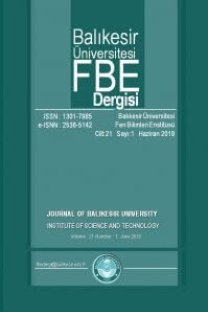Radioactivity concentrations of the milk and dairy products
Süt ve süt ürünlerinin radyoaktivite konsantrasyonları
___
- [1] United Nations Scientific Committee on the Effect of Atomic Radiation (UNSCEAR), Exposures from natural sources, UNSCEAR, (2000).
- [2] Gilmore G.R., Practical Gamma-ray Spectrometry, 2nd ed, Sussex, ENGLAND, Wiley, (2008).
- [3] Nucléide–Lara, Library for gamma and alpha emissions http://www.nucleide.org/ Laraweb/, (02.03.2017).
- [4] IAEA, International Atomic Energy Agency, Naturally occurring radioactive materials (NORM IV), IAEA-TECDOC-1472, Vienna, (2005).
- [5] Ahmed, F., Impact of fertilizers on background radioactivity level in two newly developed desert areas, Radiation Effect and Defects in Solids, 165, 1, 65–71, (2010).
- [6] IAEA, International Atomic Energy Agency, Quantification of Radionuclide Transfer in Terrestrial and Freshwater Environments for Radiological Assessments, TECDOC 1616, Vienna, (2009).
- [7] Kalac, P.A., Review of edible mushroom radioactivity, Food Chemistry, 75, 29–35, (2001).
- [8] TUIK (Türkiye İstatistik Kurumu), http://www.tuik.gov.tr, (13.12.2016). [9] European Council Regulation No 737/90.
- [10] IAEA- International Atomic Energy Agency, Guide Quantifying Uncertainty in Nuclear Analytical Measurements, IAEA-TECDOC-1401, Vienna, (2004).
- [11] Currie, L.A., Limits for qualitative detection and quantitative determination, Analytical Chemistry, 40, 3, 586-693, (1968).
- [12] Froidevaux, P., Geering, J.J., Pillonel, L., Bosset, J.O. and Valley, J.F., 90Sr, 238U, 234U, 137Cs, 40K and 239/240Pu in Emmental type cheese produced in different regions of Western, Europe Journal of Environmental Radioactivity, 72, 287–298, (2004).
- [13] Gomaa, M.A., Abdel-Fattah, A.T., Essa, M.W. and El-Shinawy, R.M.K., Radioactivity in foodstuffs in Egypt, Applied Radiation and Isotopes, 46, 6/7, 607-608, (1995).
- [14] Lavi, N., Golob, G. and Alfassi, Z.B., Monitoring and surveillance of radiocesium in cultivated soils and foodstuff samples in Israel 18 years after the Chernobyl disaster, Radiation Measurements, 41, 78–83, (2006).
- [15] Othman, I., Yassine. T., Natural radioactivity in the Syrian environment, The Science of the Total Environment, 170, 119-124, (1995).
- [16] Melquiades, F.L. and Appoloni. C.R., Radiation of powdered milk produced at Londrina, PR, Brazil, Radiation Physics and Chemistry, 61, 691–692, (2001).
- ISSN: 1301-7985
- Yayın Aralığı: 2
- Başlangıç: 1999
- Yayıncı: Balıkesir Üniversitesi
Bazı karbazol schiff bazlarının katyon bağlama özelliklerinin kondüktometrik incelenmesi
Açık kanalda batmış bitkinin akıma etkisi
Didem YILMAZER, Ayşe YÜKSEL OZAN
Nurgün BÜYÜKKIDAN, Nedime DEMİR, Bülent BÜYÜKKIDAN
Bulanık kurallara ve kenar devamlılığı kurallarına dayalı kenar tespiti iyileştirilmesi
UV ile sertleşen hibrid kaplamalarla alüminyum levhaların yüzey özelliklerinin iyileştirilmesi
Koherent saçılma üzerine moleküler girişimin etkisi
Tunceli ili Çemişgezek ilçesinin kent merkezindeki tarihi yapılarındaki bozunma analizi
